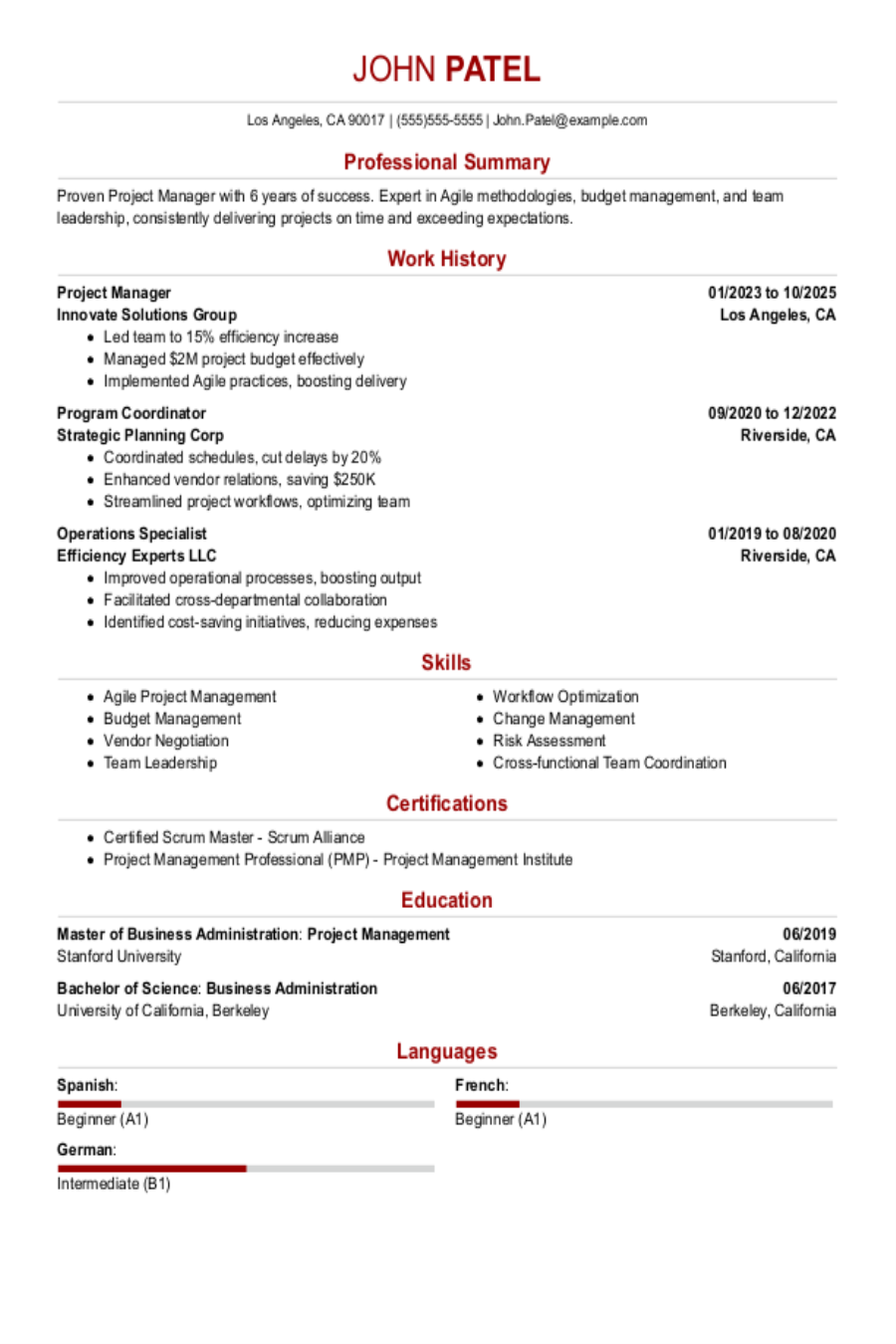Popular Internship Resume Examples
Entry-level internship resume
An entry-level resume for an internship should focus on relevant coursework, volunteer experiences, skills, and any certifications to effectively demonstrate capabilities despite limited professional experience.
Prioritizes readability: Opting for a simple resume template allows recruiters to swiftly navigate through your qualifications, ensuring key achievements stand out without distraction.
Focuses on goals: This job seeker's internship experience reflects a proactive approach to skill development in machine learning and data analysis, demonstrating their commitment to contributing effectively in the tech industry.
Mid-career internship resume
A mid-career internship resume should effectively highlight relevant experiences, core skills, and continuous personal development to demonstrate readiness for advanced opportunities in the professional landscape.
Begins with a powerful summary: This resume's professional summary highlights essential skills and experiences, enabling recruiters and ATS to quickly recognize the applicant's value.
Balances skills and experience: This job seeker's resume effectively showcases their technical expertise in data science while illustrating a clear trajectory of growth from a junior analyst to an intern, highlighting significant contributions and achievements along the way.
Experienced internship resume
An internship resume should emphasize relevant skills and experiences while clearly outlining the job seeker's growth and contributions in previous roles to attract potential employers.
Optimized for ATS: This resume uses a clear and professional template with an organized header alongside an ATS-friendly resume layout, ensuring easy navigation for both recruiters and automated systems.
Quantifies achievements: Quantifiable achievements significantly improve a applicant's profile by providing clear, measurable results. For example, stating that system efficiency improved by 15% gives recruiters a concrete understanding of the impact the job seeker made in their role.
No experience internship resume
A resume for an applicant with no experience should highlight transferable skills, relevant coursework, and volunteer activities to showcase their potential and eagerness to learn in a professional environment.
Emphasizes professional skills: Emphasizing strong communication, teamwork, and project management skills demonstrates the job seeker’s readiness for an internship, showcasing their capability to contribute effectively despite limited experience.
Overcomes lacking experience: Incorporating extracurricular activities and volunteer roles improves this resume, highlighting transferable skills and commitment that may not be apparent from limited professional experience alone.
More resume examples
Additional Guides
- Amazon
- Analyst
- Architecture
- Art
- Artist
- Arts
- Aviation
- Banking
- Billing
- Biology
- Biotech
- Budtender
- Business
- Business Operations
- Cashier
- Chef
- Chemical Engineering
- Chemistry
- Child Care
- Civil Engineering
- College
- College Graduate
- Communications
- Compliance
- Computer
- Computer Hardware
- Computer Science
- Computer Software
- Construction
- Consultant
- Cook
- Copywriting
- Cosmetology
- Culinary
- Customer Service
- Customer Success Manager
- Cyber Security
- Data Systems Administration
- Dentistry
- Driving
- ECommerce
- Education
- Electrical
- Electrical Engineering
- Engineering
- Entertainment
- Entry Level
- Environmental
- Esthetician
- Event Planning
- Executive
- Fashion
- Federal
- Film
- Finance
- Firefighter
- Fitness & Nutrition
- Food Service
- Government
- Graphic Designer
- Handyman
- Healthcare Support
- High School Student
- Hospitality
- Human Resources
- Industrial Engineering
- Insurance
- Interior Design
- Inventory Management
- IT
- Janitorial
- Law
- Law Enforcement
- Legal
- Library Museum
- Logistics
- Maintenance
- Manager
- Marketing
- Mechanical Engineering
- Medical
- Mental Health
- Metal Work
- Military
- Music
- Nursing
- Performing Arts
- Pest Control
- Pharmacy Technician
- Photographer
- Physical Therapy
- Pilot
- Plumbing
- Product Manager
- Product Owner
- Production
- Production Assistant
- Program Manager
- Project Manager
- Psychology
- Purchasing
- Quality Control
- Radiologic Technologist
- Real Estate
- Restaurant Manager
- Retail
- Safety Security
- Sales
- Sales Associate
- Scholarship
- Sciences
- Server
- Shipping
- Skilled Trades
- Social Services
- Software Engineer
- Special Education
- Sports
- Statistics
- Stay At Home Mom
- Student
- Supervisor
- Teacher
- Teen
- Training Development
- Transportation
- Travel
- Ux Designer
- Veterinary
- Virtual Assistant
- Waitress
- Web Development
Internship Resume Template
Looking to kickstart your career? Check out this internship resume template as a solid base—just personalize it with your own details and stand out to potential employers.
John Patel
Los Angeles, CA 90017
(555)555-5555
John.Patel@example.com
Professional Summary
Results-driven data professional with a decade of experience in data science, analysis, and machine learning. Proven track record in enhancing project efficiency and developing automated solutions to save time. Skilled in Python, SQL, and data visualization.
Work History
Intern
NextGen Innovations - Los Angeles, CA
November 2024 - November 2025
- Assisted in data analysis projects.
- Developed scripts reducing manual tasks by 20%.
- Collaborated with teams to enhance project efficiency.
Data Analyst
TechWave Solutions - Riverside, CA
May 2017 - October 2024
- Analyzed data leading to a 30% sales increase.
- Automated reports, reducing time spent by 40%.
- Developed dashboards for critical metrics monitoring.
Junior Data Scientist
DataAnalytics Corp - Riverside, CA
May 2014 - April 2017
- Implemented models improving prediction accuracy by 15%.
- Worked on data preprocessing increasing efficiency.
- Contributed to team goals under tight deadlines.
Education
Master of Science Computer Science
Harvard University Cambridge, MA
May 2012
Bachelor of Science Computer Science
University of California, Los Angeles Los Angeles, CA
May 2010
Skills
- Data Analysis
- Machine Learning
- SQL
- Python
- Data Visualization
- Project Management
- R Programming
- Statistical Analysis
Certifications
- Data Science Professional Certificate - HarvardX
- Machine Learning Specialization - Coursera
Languages
- Spanish - Beginner (A1)
- French - Beginner (A1)
- German - Intermediate (B1)
Writing Your Internship Resume
Having explored these impressive internship resume examples, you are now prepared to dive into how to write a resume. We'll walk you through each part of the process, ensuring clarity and confidence in your application.
List your most relevant skills
An effective skills section on your internship resume should focus on both hard skills, like specific software knowledge or research abilities, and soft skills, such as teamwork and adaptability. This balance demonstrates that you're equipped to handle various tasks while fitting into the company culture.
To maximize your chances of getting noticed, make sure to include keywords from the job listing. By aligning your skills with the requirements outlined in the posting, you not only appeal to human recruiters but also improve your visibility to applicant tracking systems.
Example of skills on an internship resume
- Proficient in using project management tools (Trello, Asana) to streamline workflow
- Adept at conducting market research and analysis for informed decision-making
- Collaborative team player with excellent communication skills
- Analytical thinker with a passion for problem-solving and creativity
A well-crafted skills section should showcase a mix of hard and soft skills. This combination illustrates the job seeker's ability to tackle technical tasks while also effectively collaborating with others in a professional environment.
Highlight your work history
A standout work experience section for an internship resume should highlight specific skills and how they contributed to the success of the team or project.
When detailing each internship entry, ensure you include key information: your title, the name of the employer, and the dates you were employed. This allows hiring managers to quickly verify your experience and see where you've honed your skills.
Example of an internship work experience entry
- Intern
XYZ Tech Solutions - San Francisco, CA
June 2022 - August 2022 - Assisted in the development of a web application by collaborating with senior developers and designers, improving user experience and functionality
- Conducted market research to identify trends and opportunities, presenting findings that influenced product development decisions and strategy
- Participated in weekly team meetings to discuss project progress and challenges, fostering strong communication and teamwork skills
- Created user documentation for new features, ensuring clarity and usability for clients, which received positive feedback from users
- Contributed to the optimization of internal processes by implementing a tracking system for project milestones, improving project efficiency by 15%
Quantifying achievements during an internship is vital as it provides tangible evidence of your contributions. For example, stating that you assisted in increasing social media engagement by 40% demonstrates your impact and can make you a more attractive job seeker to future employers.
Turning school and life experience into job skills
Starting an internship with limited experience can seem challenging, but your education and projects are great assets. Courses often involve teamwork, critical thinking, and project management—all of which are relevant skills in any workplace. Highlight class projects where you applied these skills to achieve tangible outcomes, showing potential employers your ability to contribute effectively.
Beyond academics, look at other experiences like volunteering or leading a club. These scenarios often require skills such as communication, leadership, and time management. For instance, organizing a successful event or coordinating a team effort demonstrates abilities that are valuable to any organization.
Key areas to mine for transferable skills
- Academic projects: Research papers, Presentations, Group projects, Lab work
- Leadership positions: Club officer, Team captain, Project leader, Event organizer
- Volunteer work: Community service, Nonprofit assistance, Mentoring
- Internships or part-time work: Even brief experiences in professional settings
- Personal projects: Blogs, Websites, Creative work
Include your education
The education section of your internship resume should list your academic credentials in reverse-chronological order, starting with the most recent qualification. Include degrees and relevant certifications while omitting your high school diploma if you have pursued higher education.
For those who are currently enrolled in a program or have not yet completed their degree, it is important to highlight your highest level of education achieved so far and include an expected graduation date. You can improve this section by adding bullet points that showcase relevant coursework or any academic honors received.
Common certifications for an internship resume
- Certified Marketing Professional (CMP) – Marketing Management Association (MMA)
- Digital Marketing Certified Associate (DMCA) – Digital Marketing Institute (DMI)
- Google Analytics Individual Qualification (GAIQ) – Google
- HubSpot Content Marketing Certification – HubSpot Academy
Sum up your resume with an introduction
A strong profile section on your resume is essential for making a memorable first impression. It serves as the opening statement of your qualifications, providing potential employers with a snapshot of your capabilities and career goals.
If you have substantial experience in your field, a professional summary is particularly beneficial. This allows you to showcase key accomplishments and skills prominently, enabling hiring managers to quickly gauge how your background aligns with their needs. If your experience is still growing, write a resume objective that underscores your commitment to learning and improvement.
Professional summary example
Motivated marketing intern with over 2 years of hands-on experience in digital campaigns and social media management. Demonstrated ability to drive engagement through innovative content creation and analytics-driven strategies. Proficient in SEO optimization, market research, and collaboration across diverse teams.
Resume objective example
Eager intern looking to use strong communication, teamwork, and problem-solving abilities in a collaborative work environment. Excited to contribute fresh perspectives and support ongoing projects while improving my skills in a dynamic team setting.
Crafting a strong resume profile is essential for any internship applicant. Emphasize relevant keywords from the job description to improve your chances of passing through applicant tracking systems (ATS). This initial section should showcase your qualifications and align closely with what employers seek, setting the tone for the rest of your resume.
Add unique sections to set you apart
Optional resume sections can set you apart as an internship applicant by highlighting your distinctive skills and experiences. Including these sections allows you to showcase what makes you unique beyond just education and work history.
These additional details can include relevant hobbies or volunteer activities that align with your values. They provide insight into your character and working style, showing employers how you engage with the world outside of traditional roles. By sharing these personal touches, you create a more complete picture of yourself as an enthusiastic and committed individual ready to contribute to their team.
Three sections perfect for a internship resume
- Relevant Coursework: Including relevant academic coursework on your resume can highlight your skills, especially when work experience is minimal. Select 3-4 courses that align with the job requirements and emphasize practical knowledge applicable directly to the role.
- Academic Projects: Including projects on your resume alongside relevant coursework can effectively demonstrate your foundational knowledge in a specific field. Focus on 3-4 key courses that align with the job you are applying for to strengthen your application.
- Hobbies and Interests: Including hobbies and interests on your resume can add value, especially when they are professional and relevant. For an internship in marketing, activities like blogging, social media management, or participating in marketing clubs showcase creativity and communication skills.
5 Resume Formatting Tips
- Choose a format that matches your career stage.
Selecting the appropriate resume format is essential for highlighting your experience. If you’re just starting out, a functional resume can showcase your skills effectively. As you gain experience, consider using a chronological format to highlight your career progression. A combination format is also an excellent choice if you want to present both your skills and work history cohesively.
- Pick a smart resume template.
Using a professional resume template is key to improving readability. It ensures your content stands out clearly and is easily digestible for hiring managers. If you choose a custom format, make sure it remains clean and uses fonts compatible with applicant tracking systems.
- Select an appropriate font.
Select a clean and professional font for your resume to improve readability. Fonts like Helvetica, Georgia, or Verdana help maintain clarity for both ATS and hiring managers.
- Use consistent formatting.
Align your resume text to the left and maintain even margins for a polished, professional look that improves readability and presentation.
- Keep your resume to one or two pages.
When outlining your resume, remember that resumes should be one page long unless you have extensive experience. Focus on keeping your content concise and relevant to ensure employers can quickly see your qualifications.
Tools for Your Job Search
Are you gearing up to apply for an internship that aligns with your career goals? Before you hit submit, make sure to use our ATS Resume Checker. This invaluable tool offers insights into how well your resume meets the criteria set by automated systems used by employers during initial screenings.
Need a boost in presenting your qualifications? Our AI Resume Builder provides tailored recommendations specifically designed for internship seekers, along with professional templates that help your skills and experiences stand out impressively to hiring managers.
Frequently Asked Questions
Last Updated: November 24, 2025
Yes, a cover letter is essential because it adds depth to your resume and allows you to communicate directly with potential employers. It’s your opportunity to share what draws you to the internship and highlight how your skills make you a great fit for the role. So, don’t hesitate—write a cover letter that reflects your enthusiasm.
For an efficient solution, consider using our AI Cover Letter Generator, which can help you create a customized cover letter in just minutes. You can also select from various cover letter template options that perfectly align with your resume, ensuring a polished and professional application package.
A resume is generally a concise document spanning one to two pages, focusing on your work experience and skills. In contrast, a CV (curriculum vitae) can extend several pages and includes in-depth information about your academic history, research contributions, publications, and professional experiences.
You typically need a CV for roles in academia or specialized fields like law and medicine. If you’re unsure whether to create a CV, our online CV Maker can assist you in crafting a professional document efficiently. Choose from our diverse range of CV templates designed for various industries and career levels to make the process seamless.
For an internship search, maintaining an active LinkedIn profile is important. It helps you connect with potential employers and effectively display your skills to stand out among job seekers.
In your resume, briefly state your goal, like "enthusiastic intern eager to gain practical experience." Use your cover letter to elaborate on how specific roles align with your long-term aspirations. Target positions that foster growth and skill development, ensuring they contribute meaningfully to your career journey.
To stay competitive in your internship search, actively seek out skills development and certifications related to your field. Engage with industry groups, follow relevant news sources, and participate in workshops or online courses that improve your knowledge and experience. This proactive approach will showcase your dedication to growth.
To show your commitment to continuous development, consider gaining and listing relevant certifications. Highlight any courses you’ve completed or seminars you’ve attended. Additionally, share books you’ve read and podcasts that inspire you. Joining professional associations can also illustrate your dedication to staying informed about industry trends.
Was this information helpful? Let us know!
Hailey is a career advice writer dedicated to helping job seekers excel in their careers.
More resources

63% Expect AI’s Role in Compensation to Grow Significantly in the Next 5 Years
Resume Now s latest report examines how workers are responding...

How to Include Research Skills on a Resume: 40+ Examples
Check out our guide to understand what research skills are and...

How To Write a CV: The Ultimate Guide for 2025
Here is a complete and comprehensive guide to writing a CV ev...



